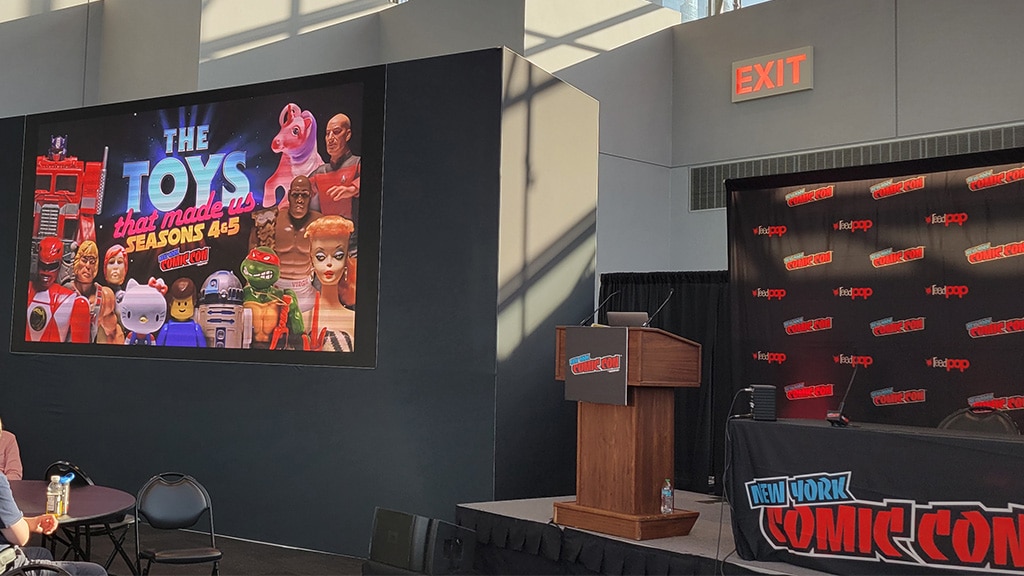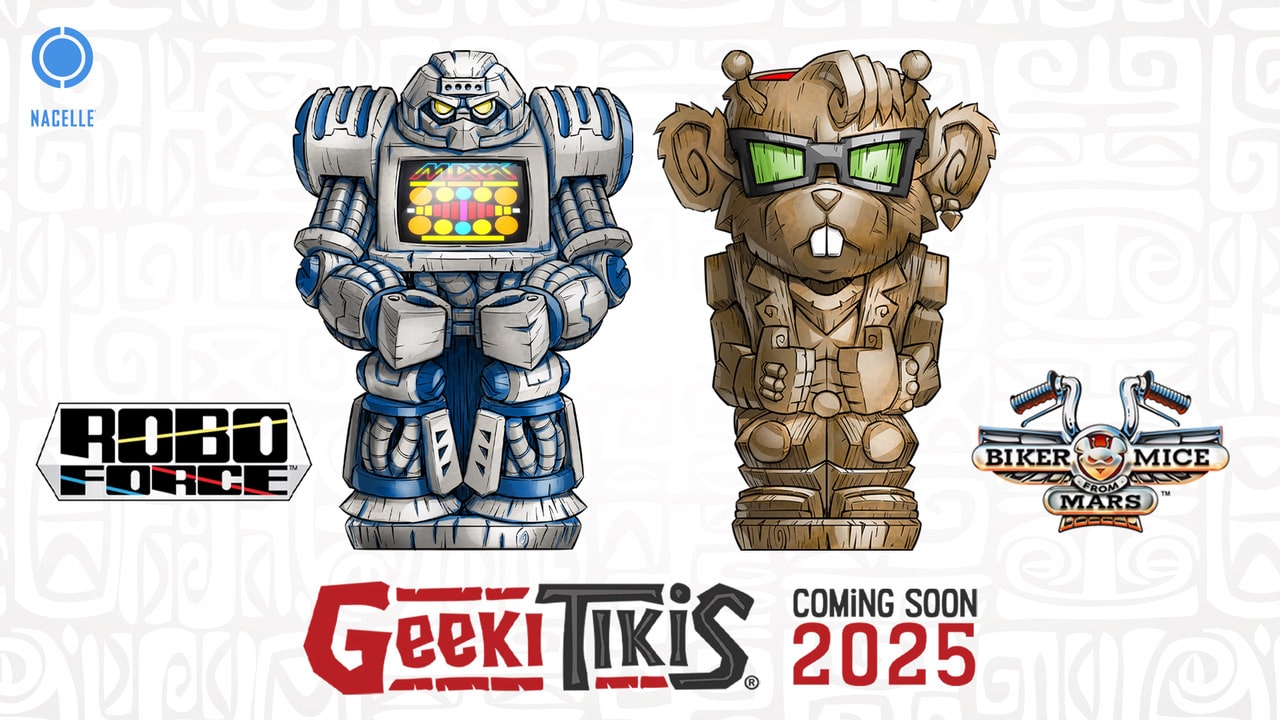Fans of the Netflix docuseries The Toys That Made Us had a particularly special treat on Saturday, as there was a panel with Toys That Made Us Showrunner and The Nacelle Co.‘s CEO Brian Volk-Weiss, Marketing Manager Bryan Adams, and Producers Brian Stillman and Maude Campbell.
During the panel, they covered the various upcoming episode topics that they initially revealed at SDCC earlier this year, confirming that production for Season 4 had begun, and held a Q&A session for the fans attending the panel.
The Pop Insider had the opportunity to sit down with Volk-Weiss just before the panel started, and we had an awesome time talking about toy history, fun facts, and the process behind producing the docuseries.
What inspired you to make a docuseries about toy history?
I love toys. I’ve been collecting toys since I was 3. But I mean, the first time I bought a toy, knowing that I wouldn’t play with it was probably junior year of college and it never made sense to me. All the shows that were on the air about so many different things and nobody was covering toys and you would see all these other shows covering collectors and stuff, and I’m like, the toy business makes in a month what this topic makes in two years. Why is no one talking about toys?
And it was really hard. It took me seven years. Everybody passed on it, some people passed on it two or three times. And then very luckily, Netflix, who we already had a lot of business with on the standup comedy side, they were very excited and they saw my logic. Why wouldn’t a show about Transformers or G.I. Joe or Star Wars toys do well? That’s why I wanted to do it. I knew a lot about [toys], and I wanted to share the knowledge. It was that simple.
What does the process look like working with each company?
Every single company is different, and every single company could be different one year later than they were (the previous year). There are many companies we work with that, I mean, it’s a really interesting phenomenon because a lot of it is about the person you’re dealing with, not really the company. So at some companies, you’re dealing with people who have been there for 20 years and they know a lot and they love what they do. Sometimes you’re dealing with people who have been there for 20 years and are waiting for another two years to go by so they can retire with a pension, and they don’t care about anything. And then sometimes you work with people who have been there for six months and they’re great. And sometimes you work with people who’ve been there for six months and who are terrible. So it really is dependent on the person and what the other variable is, how’s the company doing at that particular moment?
There are companies we work with when they’re in the first position dominating their space. Two years later they had a bunch of bombs and now they’re in fifth place. And that affects how they are to work with.
And what they’ll give us? I’ll give you a great example. So we did a deal with Hasbro for Toys That Made Us Seasons 1-3, and we went to Takara in Japan. They had a deal with Takara to do Transformers. So we go to Takara headquarters in Tokyo and we’re in this beautiful showroom with these fancy lights. We’re doing the interview and we’re interviewing some pretty senior people and everything’s great. And then someone said something in the middle of an interview was like, ‘Oh, and you should see what we have in the basement.’ So after we cut, I’m like, ‘What do you got in the basement?’ So we go down … There was no plan to take us down there. Literally no one had thought in [the U.S.] or Japan that we would want to go into the basement.
So we filmed walking to the basement, and I’m glad we did because we get to the basement, we’re in this storage room, it’s all Tupperware-type boxes, and we’re there with this 70-year-old toy designer who was there in the ’80s. It’s in the episode. He’s literally opening a Tupperware box with kind of old fading paper towels. And he’s like, ‘Oh, here’s the Optimus Prime prototype.’ And you’re like, ‘What?’ And he’s like, ‘Yeah.’ They just have it all in the basement in Tupperware and wrapped in napkins. And we have this light box where we make everything look beautiful. It’s lit from below, and we’re sitting there filming, and it’s almost like you feel, even though you’ve been walked down there, even though we have badges on, like we’ve broken in and we’re doing something we’re not supposed to be — except we had Takara’s security watching us and giving us the thumbs up. So if that doesn’t tell you what this process is like, nothing will.
I know that you had “fast food toys” and “toys that shouldn’t have been made” as ideas you want to do in the future. Are there any other toy-related topics that you’d want to cover in future hypothetical seasons?
I had those ideas before the show was greenlit. In the deck for what eventually would sell the show, I guarantee you those were both in it. There are definitely other episodes that we want to do. I call ’em group shows, or group episode, because it’s not one line. It could be multiple lines. So fast food, for example. I consider that a group episode. So yes, there are, but I will not say what they are.
What was so important with the fast food episode was that I didn’t know if it would work, so I was really, really, really worried up until the last minute, the day before San Diego (SDCC) where we announced it. We took it out, we put it in, we took it out, we put it in, and finally at the last minute, I was like, let’s just try it. And during San Diego, the lights were down. We had this video, and the whole time, I’m waiting to see what the reaction would be, and it literally got the best reaction. Oh, that’s so good. Yeah, I almost cried. I was very nervous about it.
Has there been anything new that you’ve learned while working on seasons four and five that surprised you?
Okay, so we’re doing a Ghostbusters episode, and in the original show called Ghostbusters, there was a gorilla. I think he answered the phone or something, but there was a gorilla, there was an attempt when they were making Ghostbusters 2, to do an homage to the gorilla and then include him in some of the merchandising that was under development. And it was really funny!
Sony reached out to — I forget what company it was called that made the TV show with the gorilla — but they reached out and they were like, ‘Hey, hear me out. What do you think? With your permission, we include him in the new movie, kind of like an inside joke. And then we could do toys based on it. We’ll split. We’ll split the profit.’ And that company was like, ‘Oh, you can do that for sure. We will sue you very aggressively. But yeah, go ahead and do it.’ That’s probably my favorite thing I’ve learned so far while we’re in pre-production.
What has been your favorite part of the production process for ‘The Toys That Made Us’?
I mean, without a doubt, it’s meeting people that love the show. I saw a post on Instagram a couple of days ago: We have a whole deal with Walmart where we have this end cap for all of our Nacelle toys, and this guy posted a picture; he took a picture of our end cap and he was in Council Bluffs, Iowa, and he was like, ‘Oh my God, these guys have barnyard commandos. My grandparents gave me barnyard commandos. They were killed in a terrible car trash when I was 15 and I just bought all of ’em because it reminds me of my grandparents.’ That’s why we do what we do.
I mean, listen, I gotta pay the bills, of course. I got a family. I got a company with staff and machines and everything. So don’t get me wrong, we’re not a charity at all, but it’s why we do what we do is just hearing. It took seven years to sell [the show] and a lot of people would’ve given up — and maybe they should have, and that was the right thing to do.
But because I was so passionate about it, I just had to make it, and it ended up being successful. It’s the biggest game changer in my life (other than getting married and having kids). And it was just because I love toys and I love the history. I love history in general. But then to take the premise of being a historian, connect it to toys, make a documentary about it. That’s why I’m not a dentist in Queens. I’m from a whole family of dentists. That’s what I wanted to do. And it was just to connect with people.


